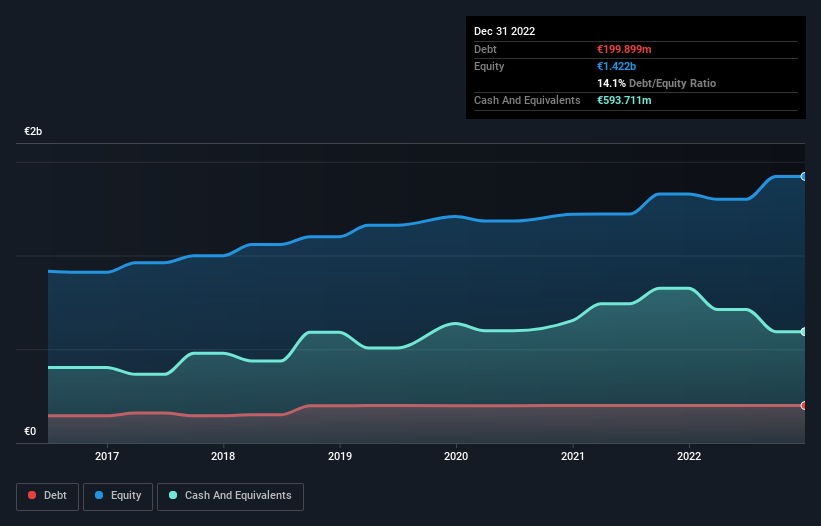
The external fund manager backed by Berkshire Hathaway's Charlie Munger, Li Lu, makes no bones about it when he says 'The biggest investment risk is not the volatility of prices, but whether you will suffer a permanent loss of capital.' It's only natural to consider a company's balance sheet when you examine how risky it is, since debt is often involved when a business collapses. We note that Jumbo S.A. (ATH:BELA) does have debt on its balance sheet. But the more important question is: how much risk is that debt creating?
Why Does Debt Bring Risk?
Debt assists a business until the business has trouble paying it off, either with new capital or with free cash flow. If things get really bad, the lenders can take control of the business. However, a more common (but still painful) scenario is that it has to raise new equity capital at a low price, thus permanently diluting shareholders. Of course, debt can be an important tool in businesses, particularly capital heavy businesses. When we examine debt levels, we first consider both cash and debt levels, together.
Check out our latest analysis for Jumbo
What Is Jumbo's Debt?
As you can see below, Jumbo had €199.9m of debt, at December 2022, which is about the same as the year before. You can click the chart for greater detail. But on the other hand it also has €593.7m in cash, leading to a €393.8m net cash position.

How Healthy Is Jumbo's Balance Sheet?
Zooming in on the latest balance sheet data, we can see that Jumbo had liabilities of €187.3m due within 12 months and liabilities of €290.4m due beyond that. Offsetting these obligations, it had cash of €593.7m as well as receivables valued at €115.9m due within 12 months. So it can boast €231.9m more liquid assets than total liabilities.
This short term liquidity is a sign that Jumbo could probably pay off its debt with ease, as its balance sheet is far from stretched. Simply put, the fact that Jumbo has more cash than debt is arguably a good indication that it can manage its debt safely.
And we also note warmly that Jumbo grew its EBIT by 12% last year, making its debt load easier to handle. There's no doubt that we learn most about debt from the balance sheet. But it is future earnings, more than anything, that will determine Jumbo's ability to maintain a healthy balance sheet going forward. So if you want to see what the professionals think, you might find this free report on analyst profit forecasts to be interesting.
Finally, a company can only pay off debt with cold hard cash, not accounting profits. While Jumbo has net cash on its balance sheet, it's still worth taking a look at its ability to convert earnings before interest and tax (EBIT) to free cash flow, to help us understand how quickly it is building (or eroding) that cash balance. Over the most recent three years, Jumbo recorded free cash flow worth 77% of its EBIT, which is around normal, given free cash flow excludes interest and tax. This cold hard cash means it can reduce its debt when it wants to.
Summing Up
While we empathize with investors who find debt concerning, you should keep in mind that Jumbo has net cash of €393.8m, as well as more liquid assets than liabilities. And it impressed us with free cash flow of €122m, being 77% of its EBIT. So is Jumbo's debt a risk? It doesn't seem so to us. The balance sheet is clearly the area to focus on when you are analysing debt. But ultimately, every company can contain risks that exist outside of the balance sheet. For instance, we've identified 1 warning sign for Jumbo that you should be aware of.
If, after all that, you're more interested in a fast growing company with a rock-solid balance sheet, then check out our list of net cash growth stocks without delay.
New: Manage All Your Stock Portfolios in One Place
We've created the ultimate portfolio companion for stock investors, and it's free.
• Connect an unlimited number of Portfolios and see your total in one currency
• Be alerted to new Warning Signs or Risks via email or mobile
• Track the Fair Value of your stocks
Have feedback on this article? Concerned about the content? Get in touch with us directly. Alternatively, email editorial-team (at) simplywallst.com.
This article by Simply Wall St is general in nature. We provide commentary based on historical data and analyst forecasts only using an unbiased methodology and our articles are not intended to be financial advice. It does not constitute a recommendation to buy or sell any stock, and does not take account of your objectives, or your financial situation. We aim to bring you long-term focused analysis driven by fundamental data. Note that our analysis may not factor in the latest price-sensitive company announcements or qualitative material. Simply Wall St has no position in any stocks mentioned.
About ATSE:BELA
Jumbo
Engages in the retail sale of toys, baby products, gift articles, household products, stationery, seasonal, home decoration items, books, and related products in Greece, Cyprus, Bulgaria, and Romania.
Flawless balance sheet, good value and pays a dividend.
Similar Companies
Market Insights
Community Narratives



